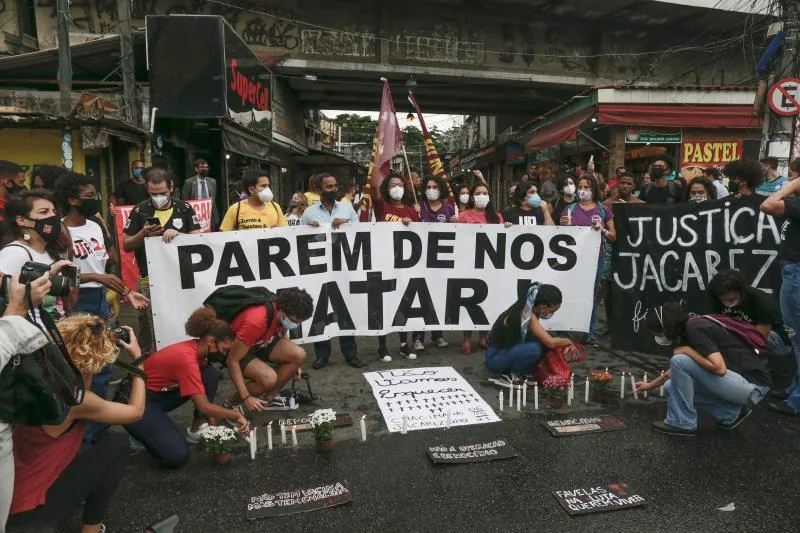RIO DE JANEIRO, BRAZIL – Demonstrators from the favela of Jacarezinho gathered this Friday in front of the Civil Police facilities in Rio de Janeiro to demand justice for the 25 lives lost the day before in a violent police operation against the criminal gang that dominates this depressed favela in Rio de Janeiro.
The uniformed officers’ action took place even though such actions are restricted in Rio de Janeiro and were the deadliest in the history of the city.

“That was not an intelligence operation. It was a complete massacre that is part of the genocide that is ongoing in our country and mainly in our state,” said Giovanna Almeida, a 22-year-old student who joined the protesters.
The operation, which involved some 200 uniformed officers and lasted nine hours, was described as “successful” by the Civil Police, which denied accusations of abuse and affirmed that the action – which was aimed at dismantling a drug gang that recruited minors for criminal activities – was planned, authorized and supervised by the Public Prosecutor’s Office.
Official figures indicate that one policeman lost his life minutes after being hit in the head at the beginning of the operation and that 24 suspects (who the police described not as mere suspects but as proven gunmen) died during the operation in the Jacarezinho favela.
Read also: Police operation causes “the biggest massacre in the history of Rio de Janeiro”
However, favela residents who witnessed the events claim that the alleged criminals were “killed” inside the homes and without resistance.
“People died sitting down, they died inside houses. The images are enlightening, and you can see that there was no exchange of shots from the direction of the blood. There was execution, there was murder,” said Milena Santos, another student who participated in the protest.
“As a carioca, woman, young, black and favelada my feeling is one of repudiation, of sadness. There were 25 young people’s lives. Suspects or not, people do not have to be killed. They are crimes; it is state violence”, he affirmed.
Carrying signs saying “Stop killing us” and “Black lives matter”, some 70 demonstrators got up early to demand justice in front of the police facilities and later moved to the Jacarezinho favela, where they placed candles and flowers at the sites where the deaths took place. About 50 armed police officers accompanied the protest.
Public security experts and human rights organizations such as Amnesty International and Human Rights Watch condemned the operation.
The mayor of Rio, Eduardo Paes, himself criticized the action of the uniformed officers. He pointed out that it results from a “non-existent and erroneous” public security policy that “puts the police at risk and allows crime to spread”.
The Ombudsman’s Office and the Public Prosecutor’s Office of Rio announced investigations into the facts.
According to official data, some 1,800 people died in police operations in Rio de Janeiro in 2019, a figure that was reduced to 1,300 victims in 2020 thanks mainly to the Federal Supreme Court order restricting police operations in favelas during confinements to the covid pandemic.
However, in the first quarter of this year alone, 453 people have died at the hands of uniformed officers, according to figures from the Public Safety Institute (ISP), an entity attached to the Rio de Janeiro Governor’s Office.
United Nations
On Friday, May 7th, the United Nations (UN) High Commissioner for Human Rights, through its spokesperson Ruppert Colville, said at a press conference in Geneva that the organization is “deeply disturbed” by the 25 deaths in the Jacarezinho community in Rio de Janeiro.
According to the spokesperson, the public security model in communities is wrong and an impartial investigation should be opened to examine the case.
The organization does not deny the existence of organized crime and drug trafficking in the communities, but contests the approach used by the military and the police.

